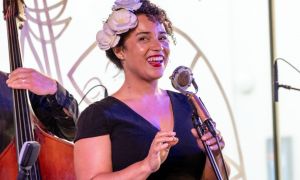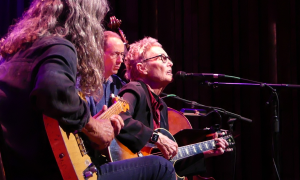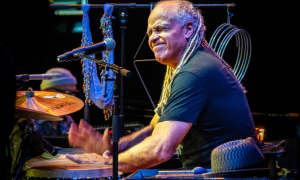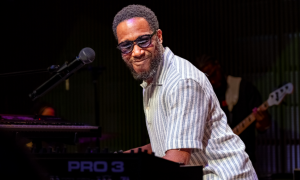Home » Jazz Articles » Live Review » Alfa Jazz Fest 2017
Alfa Jazz Fest 2017

Lviv, Ukraine
June 23-27, 2017
Jazz festivals are different in Europe. There are more of them, and they are crucial to the economic viability, social solidarity and creative evolution of the jazz art form. Many European towns that host their own annual jazz events seem like unlikely sites for festivals. They are small, and/or industrial, and/or off the beaten path. In the case of Alfa Jazz Fest, in Lviv, Ukraine, there is a jazz festival in a country at war.
No Eastern European country has gotten more media air time and ink in the United States over the last four years than Ukraine. The attention is all because of politics. In 2013, a wave of protests in Kiev's Independence Square (the "Euromaidan revolution") deposed President Viktor Yanukovych, Russia's lackey. In 2014 Russia annexed the Ukrainian peninsula of Crimea. A proxy armed conflict with Russia broke out in the eastern part of Ukraine, which borders Russia. Ukraine has also made the news in the United States because it is one of the places where people associated with President Donald Trump (e.g. one-time Trump campaign manager Paul Manafort) have had their fingers. (The extent of these shadowy dealings with once-powerful people like Yanukovych has yet to be fully revealed.)
The war is in the breakaway Donetsk and Luhansk regions, almost 1500 kilometers from Liviv, which is in the west of the country, near Poland. The whole world knows that Russia is sending arms and fighters to support the Ukrainian secessionists. Vladimir Putin even winks when he denies it. The violence has continued at a lower intensity in recent months, but soldiers and some civilians are still dying, and the conflict still creates a flow of "IDP's" (internally displaced persons).
Lviv is the Ukrainian city most strongly oriented to the West, toward Europe. Ukrainian, not Russian, is the first language spoken. Not only because of recent events, but because of 100 years of bitter history, there is profound antipathy toward Russia in Lviv. (Shops sell rolls of toilet paper with Putin's face printed on each square—a fine Ukrainian souvenir.) A question might legitimately be raised about whether an American journalist would be fully welcome there, given the current U.S. President's avowed admiration for Putin. But there was no cause for concern. The people of Lviv are warmly hospitable to Americans. In their long and often tragic history, they have lived under both Nazis and Soviet communists. They know better than to hold individuals responsible for the sins of their governments.
The old center of Lviv has a look all its own. The Nazis regarded the city has more Austrian than Russian (it was once part of the Austro-Hungarian Empire), and did not bomb it in World War II. Many of the buildings, a mix of Austrian, Slavic and Italian architectures, are from the 16th and 17th centuries. The fact that much of the cityscape looks just slightly gone to seed gives Lviv a certain decadent charm. There are rough cobblestone lanes and houses with thick, mysterious wooden doors. There are also black- domed cathedrals, large public squares, many parks and one of the most beautiful opera houses in Europe.
The most important of those public squares is Rynok, in the heart of old Lviv. It has been the center of the city's communal life for 500 years. One of the three stages for Alfa Jazz Fest was set up in Rynok. Another smaller stage was a few blocks away, behind the Potocki Palace, built as a nobleman's residence in the 1880's, now an art museum. The main stage for the evening concerts was on a hill a couple of kilometers from the center, in a venue that held 3200. It was called the "Eddie Rosner Stage," in tribute to a legendary trumpet player, "the Polish Louis Armstrong." Outside the stadium there were three "free fan zones," with big screens and piped-in sound, that could expand the total audience by upwards of 10,000. The main stage and the one in Rynok Square were tent-covered. Alfa Jazz is not a festival of intimate musical spaces. It is a huge outdoor party. The two stages in the city center were free, and were overrun all five days of the festival. Tickets for concerts at the main stage went on sale in April and sold out immediately. Such a response is unusual for a jazz festival, even in Europe. It is only partly explained by the fact that Alpha Bank, a major sponsor, acquired a large block of tickets to provide to their management and guests. The Alpha Bank connection may, however, explain the dress code. Whereas the standard attire for summer festivals in Europe is an old T-shirt from a prior year's festival and shorts or jeans, in Lviv high fashion was the order of the day. Every night, the main stage venue and its grounds were swarmed over with men in suits and women in designer dresses and high heels. (Those, like foreign journalists, who had no choice but to follow typical jazz festival casual standards, were under-dressed.)
It is natural to assume that a jazz festival is characterized, and its artistic impact mostly determined, by its headliners. It is a natural assumption but untrue. In Lviv, most of the best music came from the two free stages. For example,
.jpg)
Igor Osypov
guitar, electric
Kurt Rosenwinkel
guitarb.1970

Logan Richardson
saxophone, altoOsypov is a guitarist with a fresh, complete concept. Sometimes he reminds you of

Bill Frisell
guitar, electricb.1951
The best thing that happened in Rynok Square, and one of the best things that happened at the festival, was the Criss Cross All-Stars. Gerry Teekens, founder of the Criss Cross label of the Netherlands, was on a panel at the festival. He explained that he only records music that he likes. What he likes is latter-day hard bop. For over 30 years, his label has been a keeper of the flame for this genre. In Lviv the band was led by pianist

Misha Tsiganov
piano
Michael Rodriguez
guitar
Will Vinson
saxophone, altob.1977

Matt Brewer
bassb.1983

Donald Edwards
drumsThey started with Tsiganov's arrangement of Wayne Shorter's "Yes or No." This band kicks off every song in a brash announcement, then engulfs the song in flames. Tsiganov, born and educated in St. Petersburg, Russia, now residing in Brooklyn, is one of the best kept secrets in jazz piano. He combines the classical erudition of the Russian conservatory with merciless New York jazz chops. His solos typically begin formally, then spill free and arrive at fiercely percussive iterations of lyricism. His comping is distinctive. He does not offer the conventional chordal content but challenges and prods the soloist with sneaky dissonance and displaced hard punctuations. Vinson and RodrЁӘguez are also special players. Vinson has a sensuous alto tone that can sound as sly and seductive as Paul Desmond's, but never for long, because his eccentric thought processes always intrude on the reverie. Vinson is an outcat with an asset rare among outcats: charm. RodrЁӘguez also combines qualities not normally found together: risk and precision. Other than "Yes or No" all the tunes were originals from the band. The best were by Brewer. "Juno" and "Joya" were the mellowest pieces, but mellowness is relative. Rodriguez approached both with a measured, plaintive fervor. Tsiganov stuck an explosive solo into the middle of "Joya" which, until he attacked, had been almost ethereal.
There were two sets on the main stage that will be long remembered, especially by those of us who had never heard

Avishai Cohen
bassb.1970

Chucho Valdes
pianob.1941
You knew that the Cohen concert was going to be a formidable occasion when the members of the INSO-Lviv Orchestra began to file on stage. They just kept coming, all 60 of them. They played an overture by themselves, then Cohen walked to center stage and picked up his bass. He has something more jazz musicians could use: an instinct for showmanship. He is a natural diva. Even before he played a note, he responded to the orchestra when it began, his eyes closed, wincing, swaying to the music.
It is not uncommon for a jazz musician to be a featured soloist with a symphony orchestra. But it was striking to witness 60 musicians all assembled to serve one acoustic bassist. Of course, in Cohen's hands, an acoustic bass becomes a fully articulate vehicle for expression. There have been many versions of Thad Jones's "A Child Is Born," but none more majestic. The orchestra, with
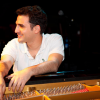
Omri Mor
pianoIn the last couple of years Cohen has played around 16 concerts with almost that many different symphony orchestras in Europe. None of these projects have yet been recorded and none have come to the United States. Based on the evidence of Lviv, they are the optimal formal for Cohen. With a symphony orchestra around him, his flair for the dramatic finds its ideal aesthetic environment.
As a jazz fan, you think you know drumming. Then you hear Chucho ValdЁҰs and realize that there are realms of percussive energy that you never knew about. The quartet in Lviv included
Yelsy Heredia
bass, acousticPedro Pablo Rodríguez
violin
Miles Davis
trumpet1926 - 1991

Bill Evans
piano1929 - 1980
The audiences at the main stage were always appreciative, but something different happened for the ValdЁҰs concert. It was apparent that the crowd was moved. They seemed to sense that they were in the presence of a living master of his genre, in a period when we have recently lost so many masters. One other nice set at the Eddie Rosner Stage was by two thirds of Mare Nostrum. Swedish pianist

Jan Lundgren
pianob.1966
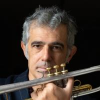
Paolo Fresu
trumpetb.1961

Richard Galliano
accordionb.1950

Antonio Carlos Jobim
piano1927 - 1994
The Alfa Jazz Fest started in 2011. In only seven years it has become an important stop on the Eastern European festival circuit. Like all jazz festivals, it requires a team of sponsors, staff and volunteers. But like most jazz festivals, it is the brainchild of one person. (Examples of this syndrome include Carlo Pagnotta of Umbria, Anne Erm of Jazzkaar and Klaus Widmann of SЁ№dtirol.) For Alfa Jazz the man is Alexey Kogan. He has been at the center of the Ukrainian jazz scene for at least 20 years, during which time he has hosted a daily radio program on Ukraine State Broadcasting, Jazz Collectors Hour. He also has a two-hour show on Friday nights, Theme With Variations. He is the artistic director of the Jazz in Kiev festival as well as Alfa Jazz. He was an omnipresent, harried figure at the festival, rushing by, shouting into his cell phone, sometimes pausing for a quick jazz handshake/chest bump.
Rynok Square was the largest and most impressive of the city stages. The crowd filled all the chairs and overflowed the sides and spilled far down Shevska Street. A cool group who played there was
 "
data-original-title="" title="">ManSound, the opening act of the festival. A six-man Ukrainian a capella vocal ensemble might not sound promising. They rocked. With their voices covering all ranges from contrabass to alto, they were a full-on little big band, with a rhythm section, brass, reeds, intricate section work, counterpoint and, of course, solos. They swung their butts off in several languages, including English for a manic "It Don't Mean a Thing" and an improbably syncopated "You Don't Know What Love Is."
"
data-original-title="" title="">ManSound, the opening act of the festival. A six-man Ukrainian a capella vocal ensemble might not sound promising. They rocked. With their voices covering all ranges from contrabass to alto, they were a full-on little big band, with a rhythm section, brass, reeds, intricate section work, counterpoint and, of course, solos. They swung their butts off in several languages, including English for a manic "It Don't Mean a Thing" and an improbably syncopated "You Don't Know What Love Is." Probably even Alexey Kogan did not expect that the smaller, more modest set-up on the lawn behind Potocki Palace would have a disproportionate number of the festival's hottest bands, but it worked out that way. Kompost 3, from Austria, is one of the world's most interesting fusion bands, perhaps because they are so much more than a fusion band. The earmarks of fusion are there, in the whiplashing of " data-original-title="" title="">Manu Mayr's electric bass and the shrieking of
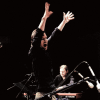 "
data-original-title="" title="">Benny Omerzell's keyboards. But within that amplitude lurked many unfamiliar ideas. The walls of sound were shot through with stabs and spatterings from trumpet player
"
data-original-title="" title="">Benny Omerzell's keyboards. But within that amplitude lurked many unfamiliar ideas. The walls of sound were shot through with stabs and spatterings from trumpet player 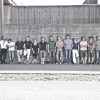
Martin Eberle
trumpet
Wadada Leo Smith
trumpetb.1941

Lukas König
drumsb.1988

Ilhan Ersahin
saxophone
Ozan Musluoglu
bassb.1977
A band very different from Kompost 3 and Ersahin's, but equally impressive in the strength of its fully developed concept, was Get the Blessing, from the UK. They played tight, ironic little ditties in crisp trumpet/tenor saxophone unisons by Peter Judge and

Jake McMurchie
saxophone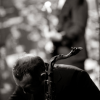
Jim Barr
bassThe secondary headliners were the Yellowjackets, whose music was programmatic and unattractive, and

Gregory Porter
vocalsb.1971
The primary headliners of Alfa Jazz Fest were

Herbie Hancock
pianob.1940

Chick Corea
piano1941 - 2021

Lionel Loueke
guitarb.1973

James Genus
bassb.1966

Vinnie Colaiuta
drumsb.1956

Terrace Martin
saxophone
Eric Marienthal
saxophoneb.1957

Frank Gambale
guitarb.1958

John Patitucci
bassb.1959

Dave Weckl
drumsb.1960
Tags
Live Reviews
Chucho Valdes
Thomas Conrad
Ukraine
Kyiv
Igor Osypov
Kurt Rosenwinkel
Logan Richardson
Bill Frisell
Gerry Teekens
Misha Tsiganov
Michael Rodriguez
Will Vinson
Matt Brewer
Donald Edwards
Avishai Cohen
Omri Mor
Yelsy Heredia
Pedro Pablo RodrЁӘguez
Miles Davis
Bill Evans
Jan Lundgren
Paolo Fresu
Richard Galliano
Jobim
ManSound
Manu Mayr
Benny Omerzell
Martin Eberle
Wadada Leo Smith
Lukas K?nig
?lhan Er?ahin
Ozan Musluo?lu
Turgut Alp Bekoglu
Izzet Kizil
Jake McMurchie
Jim Barr
Gregory Porter
Herbie Hancock
Chick Corea
Lionel Loueke
James Genus
Vinnie Colaiuta
Terrace Martin
Eric Marienthal
Frank Gambale
John Patitucci
Dave Weckl
Comments
PREVIOUS / NEXT
Chucho Valdes Concerts
Nov
14
Fri

Chucho Valdés - Royal Quartet
Palau De La Música CatalanaBarcelona, Spain
Nov
15
Sat

Chucho Valdés - Royal Quartet
Sala VillanosMadrid, Spain
Support All About Jazz
 All About Jazz has been a pillar of jazz since 1995, championing it as an art form and, more importantly, supporting the musicians who make it. Our enduring commitment has made "AAJ" one of the most culturally important websites of its kind, read by hundreds of thousands of fans, musicians and industry figures every month.
All About Jazz has been a pillar of jazz since 1995, championing it as an art form and, more importantly, supporting the musicians who make it. Our enduring commitment has made "AAJ" one of the most culturally important websites of its kind, read by hundreds of thousands of fans, musicians and industry figures every month.





 Buy Now
Buy Now






